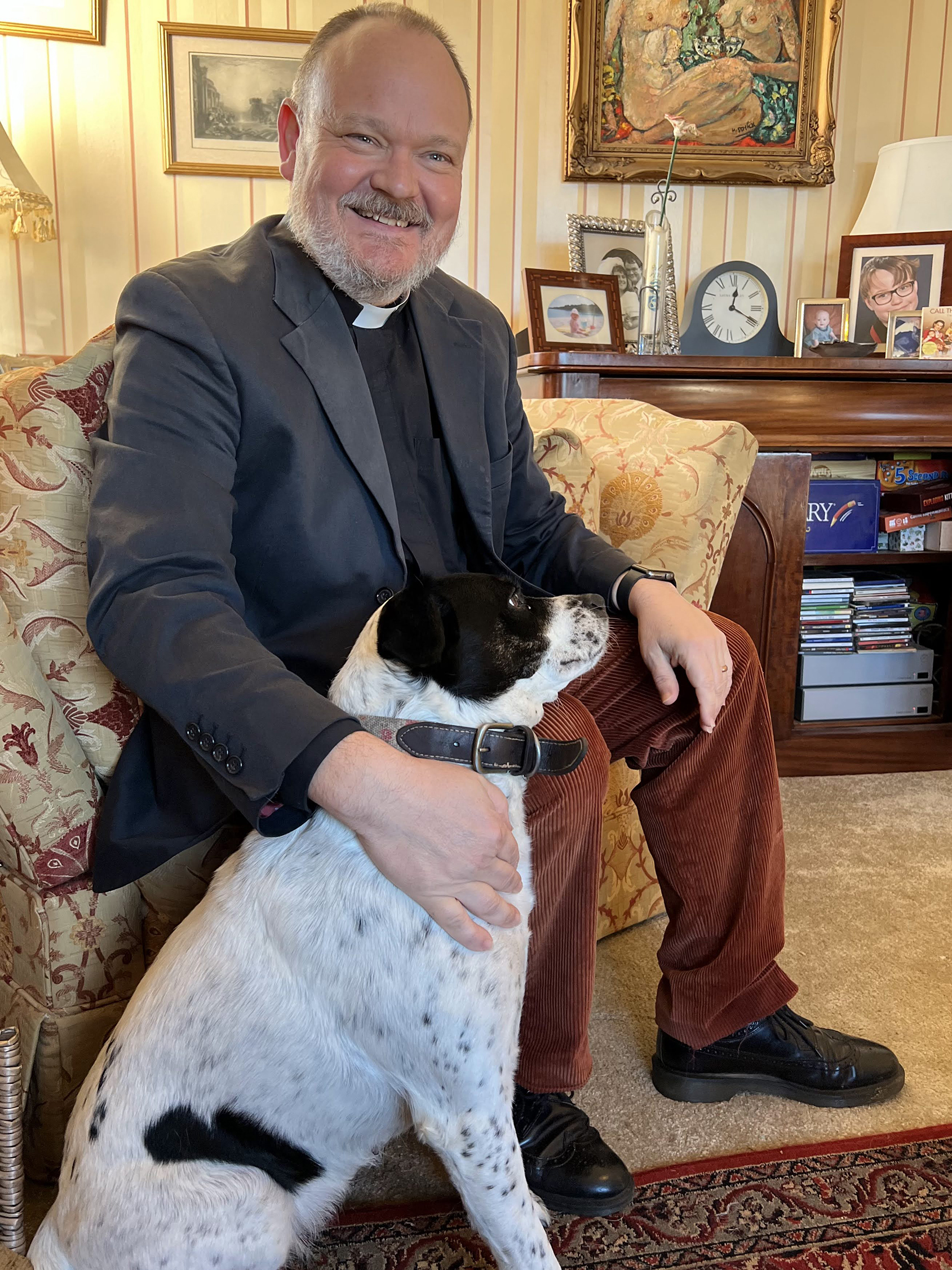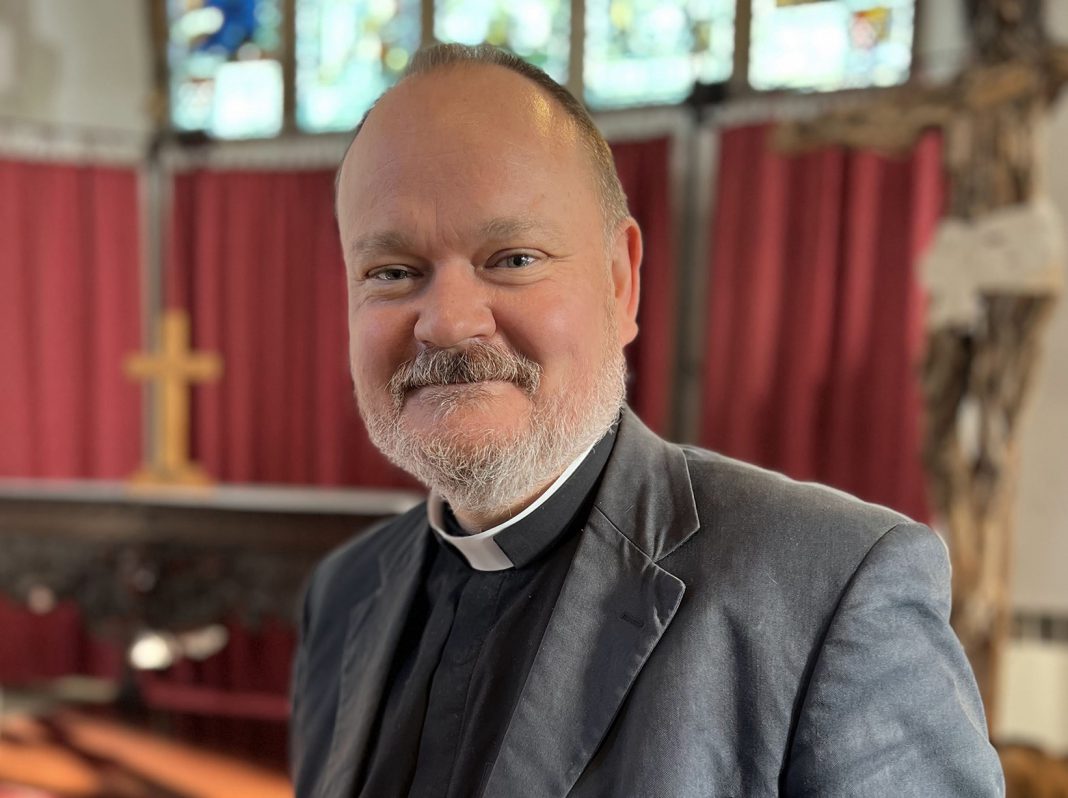In the first of a new series, the private face of the public man or woman, Kt Bruce speaks with the new team rector of the Rye Team Ministry Paul White.
What legacy would you like to think you have left?
As someone who speaks to a lot of bereaved families, and goes to a lot of funerals, I do hear a lot about the “legacies” that people leave behind.
On the whole, no one is remembered fondly for their wealth, their fancy clothes or which car they drive. Few are even remembered for what they achieved in their day jobs. Our legacy to the world, in terms of the way in which we are remembered, is the extent to which we have loved those around us. So, as a husband, a father and a priest I would want my legacy to be someone who loved those around them and loved them for who they are rather than for what they can do. As a grown-up with a big job, it can often feel that “busy-ness” and the desire to “get things done” is the antithesis of being loving, and it probably is, so I have to remind myself to slow down, be kind and demonstrate the loving response in every situation.
What two things do you think it is important to teach children?
I am a father to two amazing children and, actually, they are my most important legacy to the future!
Children today absorb a lot of information about the world in a very different way from the generations which went before – they don’t watch the news or read physical newspapers, rather they are bombarded with a variety of online feeds, some of which can have significant agendas. Therefore, the first thing I would want to teach all children is critical thinking. They should learn to challenge, question and research things for themselves and not accept memes or soundbites as truth. Some politicians seem happy for us to slide into a “post-truth” future so we need to encourage the young to resist that.
My second one, I am aware, makes me sound a bit old. I grew up in rural north Essex and enjoyed a childhood of playing in woods and streams, riding my bike until late on summer evenings and having a great deal of outdoor freedom. Children are often concerned about the environment and about climate change but seem to be so from behind a screen. So, I would encourage them to go outside, engage with nature at first hand, play with real friends in real places and, dare I say it, take a few risks. We don’t remember the endless hours before a screen but we all remember getting stuck up a tree.

Did you always want to be a priest?
Yes and no. I distinctly remember the first time I encountered a sense of the holy, an experience of God if you will, when I went to church at the age of nine. There was nothing special about the church or the service and there was no special provision for children. I simply sat in the pew in an ordinary country church in an ordinary communion service. But I will never forget the sense of God dwelling in that place and dwelling in me – my heart was strangely warmed, so to speak. After that I remember finding an old prayer book at home, lighting a couple of candles and having a “service”. I later felt called to get myself a bible and read the gospels and I probably self-identified as a Christian at about the age of 17.
That early experience did not translate into an early vocation to the priesthood. Instead, I did the “right” thing and studied law at university and became a solicitor which, for the most part, was a wonderful career. However, I could never shake the sense that, at some point, I would have to explore the sense of calling into the church. By my mid-thirties it became unavoidable, and I went to speak to my local vicar and, within a year or so, I was training for ordination. Whilst life always has its challenges, I have no doubt that I am in the right place, doing what God has called me to do, at the right time in my life. And that is good. Listen to what you are called to do.
What is your favourite place?
If I were being interviewed for any other publication I would probably say Rye! In all honesty there are few places I would rather be, and we feel very blessed to be here.
So, my other favourite place is the Isles of Scilly, which are about 25 miles south west of the coast of Cornwall. For those that don’t know them, it is an amazing archipelago of islands which, in the summer, looks like a slice of the Caribbean. My favourite place on the Isles of Scilly is probably the island of St Agnes, specifically on a warm summer’s evening after the day trippers have gone home and the smell of warm heather mixing with the sea breeze gives me a little foretaste of heaven.
What would you put into Room 101?
Computer passwords and the people who make up the rules about what they should contain. What on earth is a “special character” and how does that make all the others feel? I have a thumbprint, let’s use that for everything and be done with all the faff.
What is your favourite music?
This is a really hard one for me because I have always had really wide and eclectic musical tastes. When I say wide I mean everything from heavy metal to opera to choral music to folk music to bands like The Divine Comedy and Bellowhead. I love going to see live music and I have been lucky enough to see the Rolling Stones, Eric Clapton, Bob Dylan, U2, and many operas in London and at Glyndebourne. There is some music I don’t like; I can’t stand Eurovision pop pap. Not sure I can choose one favourite out of all that, because it all depends on the mood and the season. If you forced me to choose then it would probably be the Verdi Requiem and, in particular, the Dies Irae movement.
What is your favourite book?
Apart from the Bible, the novel I have re-read the most is Jonathan Strange and Mr Norrell by Susanna Clarke. It is a huge tome of a book (with footnotes) and it is set in an alternate version of the world in which “practical magicians” can affect the events of the world and in which the eponymous heroes vie with each other for supremacy. The best novels succeed in creating new worlds and this book draws you into that magical but believable world and I have probably just talked myself into reading it again. Susanna Clarke has also published a new novel (Piranesi), which is entirely different, but is still a work of art and, incidentally, I saw a copy for sale in Rye the other day. Avoid the TV adaptation of Jonathan Strange and Mr Norrell, it’s terrible.
Who would you like to sit and talk to on a park bench?
My maternal grandfather died when I was 17, before I got the opportunity to know him properly as a grown up. He was always the life and soul of every party and family lore has it that he gave me a turkey leg to gnaw on as a baby and he certainly gave me my first taste of Guinness, at the age of eight, in a pub just off the Roman Road in London. He served in the Royal Navy during the war and, evidently, had a few ships sunk under him, but never spoke to me about that. He would have been completely nonplussed at the idea of his grandson ending up as the rector in Rye. So, yes, I would like to sit on a bench with him in order to learn more about the bits of his life which happened before I was born and to tell him about the bits of my life which have happened since he died. But I hope to get the chance to do that one day, when we shall have eternity to get to know those we have loved and lost.
Image Credits: Kt Bruce .




What a lovely article Kt Bruce and having met The Rev Paul White at one or two of his services
he seems a very approachable man and is keen to be part of our community which is a good thing! Let’s support him and his family as it can’t be easy taking a new parish in particular something as diverse as Rye!
We’ll said, Lisa. I love your comments which are always so positive and constructive, as was the article to which you refer.
Thank you Lisa! I am keen to get involved with Rye (and with all the other communities in the team) and I always enjoy diversity!
Best wishes,
Paul
Thank you Christopher and Paul my pleasure!